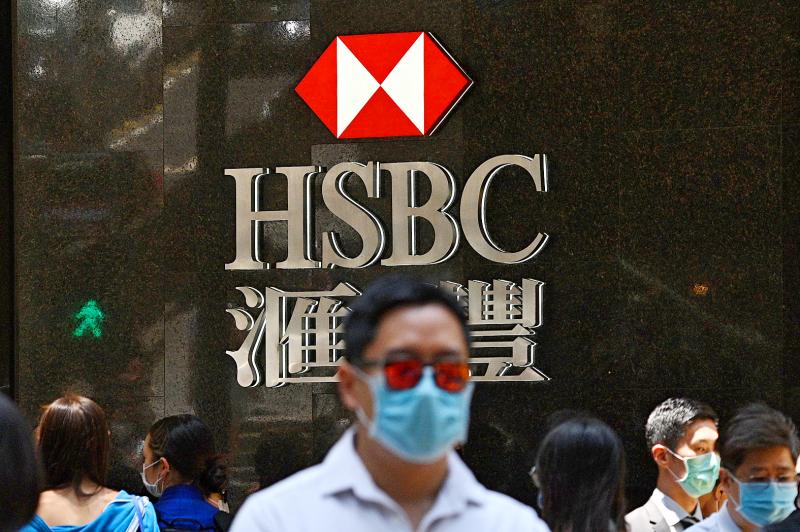Ninety-five percent of Taiwan’s financial firms think that sustainable finance would benefit businesses and enhance the stability of the nation’s financial systems, the results of a survey conducted by HSBC Bank (Taiwan) Ltd (匯豐台灣商銀) and the Taiwan Business Council for Sustainable Development showed on Tuesday.
The survey of 151 local financial firms in the banking, insurance, and securities and investment sectors was conducted in October and November last year.
Ninety percent of respondents have incorporated environmental, social and governance (ESG) factors into their decisionmaking process, it found.

Photo: AFP
Of those, 48 percent have established formal policies to require employees to take ESG factors into consideration when making investment decisions, while 24 percent consider ESG issues in some cases and 18 percent have no such policy.
Fifty-five percent of securities and investment consulting companies have established formal policies, which ranked first in the three financial sectors, followed by 50 percent of banks and 30 percent of insurers, the survey showed.
However, among the financial firms that have incorporated ESG factors into their investment decisionmaking process, only 33.3 percent think they are skilled in analyzing ESG factors, while other firms said it is difficult or costly to gain enough information on ESG, the survey found.
A lack of quantitative information on ESG, difficulty in verifying the information and disclosure of superfluous information were the main challenges for the respondents, the survey said.
Eighty-six percent of respondents believe that government policies and regulations were the major drivers for financial firms to implement sustainable finance.
However, implementation would not accelerate unless senior management supports the policies and a company has enough professionals, the poll said.
According to the survey, 48.9 percent of respondents have established goals to boost their sustainable finance business, with some focusing on responsible investment and others concentrating on developing ESG-related products, such as ESG bonds or funds.
Ninety-five percent of securities and investment consulting companies expect sustainable investment to increase, compared with 93.9 percent of banks and 92.3 percent of insurers, the poll found.
Overall, more than 60 percent of respondents thought that boosting sustainable finance would help improve their financial performance, the survey showed.
“Sustainable finance is one of HSBC’s global development goals, and shows great potential in the local stock market,” HSBC Taiwan chief executive officer Adam Chen (陳志堅) said in a statement.

TAKING STOCK: A Taiwanese cookware firm in Vietnam urged customers to assess inventory or place orders early so shipments can reach the US while tariffs are paused Taiwanese businesses in Vietnam are exploring alternatives after the White House imposed a 46 percent import duty on Vietnamese goods, following US President Donald Trump’s announcement of “reciprocal” tariffs on the US’ trading partners. Lo Shih-liang (羅世良), chairman of Brico Industry Co (裕茂工業), a Taiwanese company that manufactures cast iron cookware and stove components in Vietnam, said that more than 40 percent of his business was tied to the US market, describing the constant US policy shifts as an emotional roller coaster. “I work during the day and stay up all night watching the news. I’ve been following US news until 3am

UNCERTAINTY: Innolux activated a stringent supply chain management mechanism, as it did during the COVID-19 pandemic, to ensure optimal inventory levels for customers Flat-panel display makers AUO Corp (友達) and Innolux Corp (群創) yesterday said that about 12 to 20 percent of their display business is at risk of potential US tariffs and that they would relocate production or shipment destinations to mitigate the levies’ effects. US tariffs would have a direct impact of US$200 million on AUO’s revenue, company chairman Paul Peng (彭雙浪) told reporters on the sidelines of the Touch Taiwan trade show in Taipei yesterday. That would make up about 12 percent of the company’s overall revenue. To cope with the tariff uncertainty, AUO plans to allocate its production to manufacturing facilities in

Six years ago, LVMH’s billionaire CEO Bernard Arnault and US President Donald Trump cut the blue ribbon on a factory in rural Texas that would make designer handbags for Louis Vuitton, one of the world’s best-known luxury brands. However, since the high-profile opening, the factory has faced a host of problems limiting production, 11 former Louis Vuitton employees said. The site has consistently ranked among the worst-performing for Louis Vuitton globally, “significantly” underperforming other facilities, said three former Louis Vuitton workers and a senior industry source, who cited internal rankings shared with staff. The plant’s problems — which have not

COLLABORATION: Given Taiwan’s key position in global supply chains, the US firm is discussing strategies with local partners and clients to deal with global uncertainties Advanced Micro Devices Inc (AMD) yesterday said it is meeting with local ecosystem partners, including Taiwan Semiconductor Manufacturing Co (TSMC, 台積電), to discuss strategies, including long-term manufacturing, to navigate uncertainties such as US tariffs, as Taiwan occupies an important position in global supply chains. AMD chief executive officer Lisa Su (蘇姿丰) told reporters that Taiwan is an important part of the chip designer’s ecosystem and she is discussing with partners and customers in Taiwan to forge strong collaborations on different areas during this critical period. AMD has just become the first artificial-intelligence (AI) server chip customer of TSMC to utilize its advanced